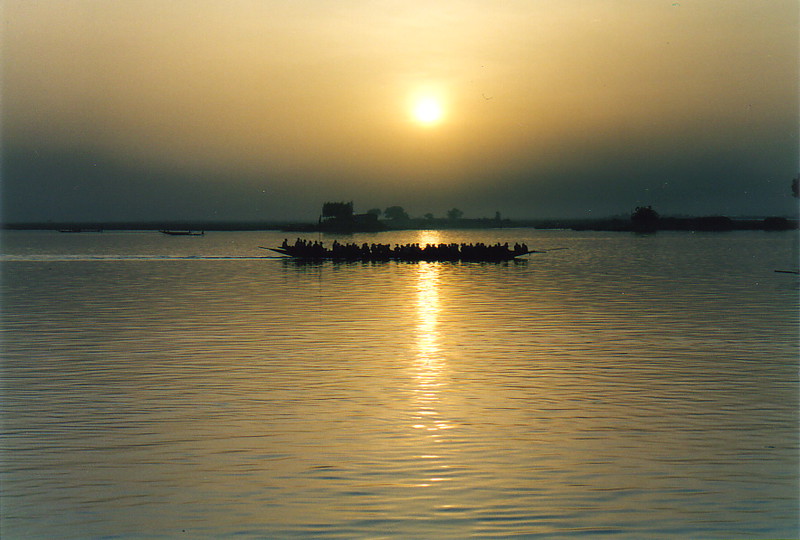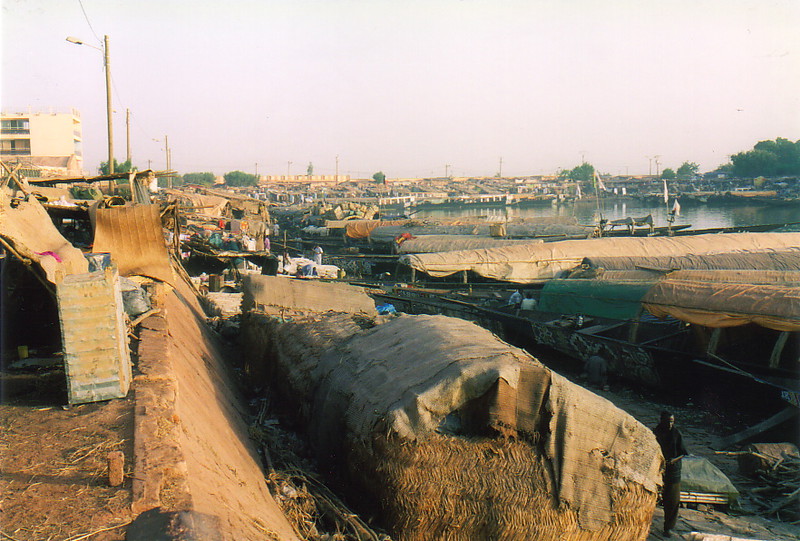
Poor Mopti. It has such a pleasant name, the sort you'd give to a particularly endearing floppy-eared dog or a favourite teddy bear, but the odds were stacked against it from the start. I was never going to like the place.
The problem was that I didn't exactly turn up in Mopti in the most optimistic frame of mind. I decided to take the overnight bus from Bamako because it was by far the easiest option; as the buses are ex-European coaches with pleasantly padded seats – some of them still sporting stickers showing regions of faraway places like Germany, so they even feel European, if you ignore the driving – it's a comfortable way to get from the nation's capital to the nation's centre of tourism. Unfortunately my guts decided to throw a spanner in the works, and on the morning before leaving Bamako, I encountered my second bout of African belly. It wasn't as savage as the first one – I was nauseous but I wasn't actually throwing up, for which I was extremely thankful – but when you're cooped up in an overnight coach, wincing with the spasms, it doesn't bode well for a good night's sleep. And that's before the constant all-night music, played at full volume, starts to hammer the outside of your skull like a particularly irritating child.
By the time I arrived in Mopti at 4am I was practically jelly, and the last thing I wanted was to have to take on the brunt of Mali's tourist trade. Mopti is a largish town, pleasantly situated on the banks of the River Niger, but its position between the world-famous mud mosque of Djenné and the world-famous trekking area of the Dogon Country means it's the busiest stop-off point for tourists in Mali, and as a result the touts are spectacularly keen. I thought Bamako had been a little too full of guides trying to offload their wares, but Mopti makes Bamako look like a pleasant stroll in the park.
As I stood there by the side of the road, wondering why I was having to wipe the sleep from my eyes when I hadn't actually had any, a conveyor belt fed irritatingly ingratiating touts right to my door, dumping them so thick and fast by my feet that I felt like a guest speaker at a Star Trek convention, surrounded by unrelenting weirdoes with bad breath and no social skills. I couldn't get my brain into gear, so I simply stared into the middle distance and ignored them with polite, vacant smiles. They could try all they liked; I wasn't physically up to a reaction, even if I'd wanted to communicate.
Luckily sharing the bus ride with me was Brook, a friendly Canadian who was also hoping to get to Timbuktu, and while I stood there guarding the bags and peering at the touts through the soupy haze of my gunked-up eyes, he strode off to ask about transport to Timbuktu along the River Niger. The roads to Timbuktu don't really deserve that title – they're four-wheel-drive tracks that take a good couple of days to navigate – so the river is a much more pleasant alternative, and that was why we'd come here. We needed to find a boat.
Thanks to some sterling detective work from Brook and some pathetic dribbling noises from me, we finally worked out the choices. Cheapest at CFA10,000 per person, and easily the most primitive, was a pinasse (a large pirogue) that was heading direct to Timbuktu the next day, taking three days to float downstream along the Niger and providing sleeping accommodation on top of a bunch of rice sacks on the lower deck; next up the scale, at CFA12,500 per person, was a larger and more luxurious pinasse with a sheltered upper deck for sleeping, which was also leaving the next day, but which wasn't direct – we'd have to change onto another pinasse in Tonka, about two-thirds of the way to Timbuktu; and finally there was the CFA19,500 public CMN ferry, where third-class accommodation was in 12-bunk dorms, meals were included, and there was even a bar, though the smell from the toilets managed to curb any pretensions to luxury the ferry might have.
Unfortunately I was too frazzled to make a decision, so avoiding the issue and the touts, I found myself a bed and nearby toilet in the local mission, and Brook headed off to do battle with the banks. I couldn't handle Mopti without regrouping and forming a battle plan; hell, I couldn't even handle standing up...
Decisions, Decisions

I sunk into a coma for a few hours, and it helped; after a shower, another colonic symphony and some rehydration salts, things looked a lot better. I decided I wasn't going to be able to handle the cheaper pinasse as there simply wasn't enough shelter from the baking Malian sun, and Brook fancied a pinasse trip over the more touristy ferry, so we took Buddha's middle way and chose the larger pinasse. Of course, by this time the price had shot up to CFA15,000 – 'Morning prices are different to afternoon prices' was the irrefutable excuse offered by the man in charge of the tickets – but we'd both had enough of negotiating and just wanted something booked, so we coughed up the money, took the tickets, and prayed for a swift exit.
For Mopti is quite unrelenting. As a white person there's nothing you can do to hide that fact that you're a tourist and therefore fair game for the touts, and this earns you the magnetism of a lump of iron the size of Manhattan. As soon as you stretch a toe outside your hotel you're accosted, and it absolutely doesn't matter what you say as it will all fall on completely deaf ears. The mantra is uninventive, but at least it's consistent:
'You going to Dogon? I am from Dogon, I can show you the best sights. You're not going to Dogon? Maybe later, maybe you want to book a guide for later? I am Dogon myself, I know the area very well. What? You're going to Timbuktu? Aha, do you want a guide to Timbuktu? I am from there, I have many friends there, I can show you the best sights. Do you want to book a guide? Maybe later?'
'You want a ticket for the bus to Bamako? Ah, OK, you're not going to Bamako, you want a ticket for Gao, Timbuktu, Dogon? You're going by pinasse already? But I can sell you a ticket for the bus! You want a ticket for the bus for Bamako?'
'What are you looking for? Camera film? No problem, I show you the shop, it's here, yes, I know you like to shop alone, but I will help you anyway. There is some film, in the shop that you were about to go into anyway. Here, let me pick it off the shelf for you and talk to the man in the shop so I can get a commission for bringing you here, even though I didn't. By the way, do you need help breathing, or perhaps you need help eating? I can help you with everything! Whatever you want, I can get you a cheap price.'
'You want to buy water? I can sell you twelve bottles for CFA6000 – water is very expensive in Timbuktu. If you buy a case it will save you money. Yes, it is heavy, but it is a good deal. Perhaps I bring it to you this afternoon, do we have a deal?'
'You want a pinasse trip? Oh, you already have one, with which pinasse? What, that one? But that is not going today, and it is not going to Timbuktu; you must change. You know this? Why not change to my pinasse, over there, it is quicker and is going today. What's that? You'd rather travel in a chicken coup? No problem, I can find you a chicken coup if you'd rather. Come this way...'
'Where you from? England, I have many friends in England. How long in Africa? First time in Africa? First time in Mali? What's your name? You visit Dogon? You visit Timbuktu? I have many friends in Timbuktu. You like Mopti? Ha, you joke well. Yes, there are many guides in Mopti. Is good, yes? Hello? Monsieur? Where you going?'
'Ah, I see you are walking. Yes, you can walk this way, this way there is a market, what do you want, food, water, maybe tickets? I can get you anything. Yes, we meet before, you remember me, I help you buy film. Perhaps now I talk to you about Dogon Country. You like Dogon Country?'
It's sad, but every tourist you see is fighting the same urge, the urge to scream 'Just fuck off!' at the constant barrage of intrusions, but this won't get you anywhere. The only solution – if it can be called a solution – is to try to be polite but firm, in the hope that they'll realise you aren't going to give them any money, and will head off to pester someone else. But boy, it doesn't half take it out of you, especially if you're feeling ill to start with.
Exploring Mopti
Even if you can ignore the touts, Mopti unveils itself as a pretty grim little place. The River Niger is its saving grace as it flows gently past, flat as a pancake with gently sloping banks on either side leading up to the concrete bunkers that pass for shops and houses in these parts. It's a busy port, and boats and pinasses smother the shore, a constant barrage of loading and unloading stirring up the mud while women do their washing by the water's edge. A little to the south of the ferry terminal is a U-shaped harbour that's lined with hundreds of pinasses pulled up onto the shore, making it look like the rim of a particularly dirty toilet, for there is the detritus of human cargo everywhere – dead fish rot in the sun, black plastic bags choke the waterline and the Niger turns a dirty shade of grey as it laps against the boats.
It's interesting, though, if you can see past the ugly exterior. Boats arrive from Timbuktu laden with slabs of salt from the salt mines in the north of Mali, dug out of ancient lakes by people who live in terrible conditions that equate to slavery in all but name, and pinasses leave for the north weighed down with barrels of petrol, sacks of rice, watermelons and so many people that the lower decks sprout arms and legs like oars. It's busy, bustling, hectic and hot, but that's what you get when you're perched on the Niger as it starts its bend north towards the Sahara, before curving right round through Niger and to the sea in Nigeria. Junction towns are rarely beautiful, and Mopti is no exception.
'It's a place to pass straight through, as quickly as possible,' said one traveller I met in the melee. If only my food hadn't applied exactly the same sentiment to me, I might have enjoyed Mopti a little bit more...